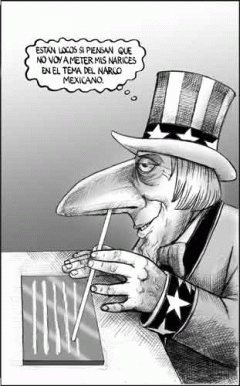
UNCLE SAM SAYS:
'THEY'RE NUTS IF THEY
THINK I WON'T STICK MY NOSE INTO THE
ISSUE OF MEXICAN DRUG TRAFFICKING'
[Excelsior, Mexico]
Folha, Brazil
Bad-Mouthing U.S.
Aid Won't Solve Drug Crisis
"Consumption, needless to say, is concentrated in the United States and Europe, but it's spreading uncontrollably through Brazil and the rest of Latin America - which was previously just a production and transit center."
By Clóvis Rossi

Translated By Helene Hill
October 20, 2009
Brazil - Folha - Original Article (Portuguese)
|

|
|
Colombian President Alvaro Uribe: No friend of drug legalization.
BBC NEWS VIDEO: Massive
crackdown across U.S. against Mexico drug cartels nets 750
people, $59 million in cash, 149 vehicles, three aircraft, three ships,
16,000 pounds of pot, 12,000 kilos of cocaine and over a million Ecstasy
pills, Feb. 25, 00:00:50 
BBC NEWS VIDEO: U.S. announces arrest of over 1100 people and the seizure of $32 million, 2,700 pounds of methamphatamine, 4,400 pounds of cocaine, 16,000 pounds pf marijuana, and 29 pounds of heroine over the course of a 44 month investigation into La Familia, one of the largest Mexican drug cartels, Oct. 23, 00:02:04 
|
|
|
Near the end of a long,
self-congratulatory speech at the close of the Brazil-Colombia business seminar
at Fiesp yesterday, Colombian President Álvaro Uribe introduced the theme of drug
legalization, but only to condemn it.
“The tolerance of consumption
is equivalent to legalization through the back door,” Uribe said.
It wasn't an explicit
condemnation of legalization, but the reiteration of Colombia's previous
position, shared by President Luiz Inácio Lula da Silva, which is: as long there
is drug consumption and production, there will necessarily be trafficking. Consumption,
needless to say, is concentrated in the United States and Europe, but it's
spreading uncontrollably through Brazil and the rest of Latin America - which
was previously just a production and transit center.
Put another way, Uribe is
reaffirming his support for a strategy that is essentially politico-military, whereas
most experts see this approach as outdated (for more on this, see Sept. 8
articles Drugs Win the war. So What? and The Reader and Drugs).
Posted
by WORLDMEETS.US
Evidence that the war is
being lost was a statement issued yesterday by the White House, announcing the extension
of a "national emergency" on drugs, which was declared 14 years ago (more
precisely, on the October 21, 1995).
The continuation is justified
by the fact that the activity of the traffickers, “centered in Colombia, continues
to threaten national security, foreign policy and economy of the United States,
causing an extreme level of violence, corruption and harm within the United
States and abroad.”
'EMERGENCY' WOULD HAVE ENDED THIS MONTH.
If they are sincere, neither
Presidents Uribe nor Lula will deny that the problems highlighted yesterday by
their colleague Barack Obama are even more acute in Brazil and Colombia -
countries that are far more institutionally fragile. Proof of this is the battle
that led to the downing of a helicopter in Rio de Janeiro at the end of last
week, which coincided with Sunday's assassination by the FARC (a Colombian narco-terrorist group)
of two city councilors from a town near Bogota.
[Editor's Note: The FARC, shorthand for the
Revolutionary Armed Forces of Colombia-People's Army, is a left-wing guerilla
group that is said to control about 40 percent of Colombian territory [see map below].
Funded largely through drug-trafficking, the group is the central target of
U.S. sponsored Plan
Colombia, a package of military and non-military aid that has cost about $3
billion over the past five years].

The worst is that Lula
insists on the idea that UNASUL,
the Union of South American Nations, should take care of combating drugs with a
home-grown mechanism - in other words, one that would dispense with the United
States. There is nothing wrong with that, but it's essential that they move from
ideas to action - something that isn't happening.
If proof were necessary, one
could point to the uproar surrounding the Colombian bases that will be used by North
American soldiers. UNASUL has already held two or three meetings on the matter,
and hasn't gotten anywhere.
Posted
by WORLDMEETS.US
This shows that the mistrust
between Colombia and Venezuela, for example, remains as it was. By extension, the
chances of creating a defense mechanism among ourselves, even if limited to
combating drugs, is pretty close to zero. In the final analysis, they are neither
considering legalization nor of confronting the problem head-on.

SEE ALSO ON THIS:
Semana, Colombia:
U.S. Military Bases are Alright, Under One Condition ...
La Jornada, Mexico:
Washington's Strategy of 'Chaos and Intervention' in Mexico
La Jornada, Mexico:
Calderon's Bush-Style Militarization of Mexican Politics
Excelsior, Mexico:
Mexico Needs 'Deeds, Not Words' From Obama White House
El Universal , Mexico:
How Mexico Could Legalize Pot - Whether U.S. Likes it or Not
Excelsior, Mexico:
As Blood Flows, U.S. Gets Serious About the Battle for Mexico
Excelsior, Mexico:
Relations Between U.S. and Mexico are Deteriorating
La Tercera, Chile
Mexico's Drug War: No Way Out But to Fight On
Semana, Colombia:
Michael Phelps and American Hypocricy on the Use of Drugs
El Financiero, Mexico:
Chavez Tells Obama: 'Align Yourself Toward Socialism with Us'
|

|
Clovis Rossi is a special correspondent and member of the Folha
editorial board, is a winner of the Maria Moors Cabot award (USA) and
is a member of the Foundation for a New Ibero-American Journalism. His column
appears on Thursdays and Sundays on page 2 and on Saturdays in the World Notebook
section. He is the author, among other works, of Special Envoy: 25 Years
Around the World and What is Journalism?
.
E-mail: crossi@uol.com.br
|
CLICK HERE FOR PORTUGUESE VERSION
[Posted
by WORLDMEETS.US October 27, 4:36pm]